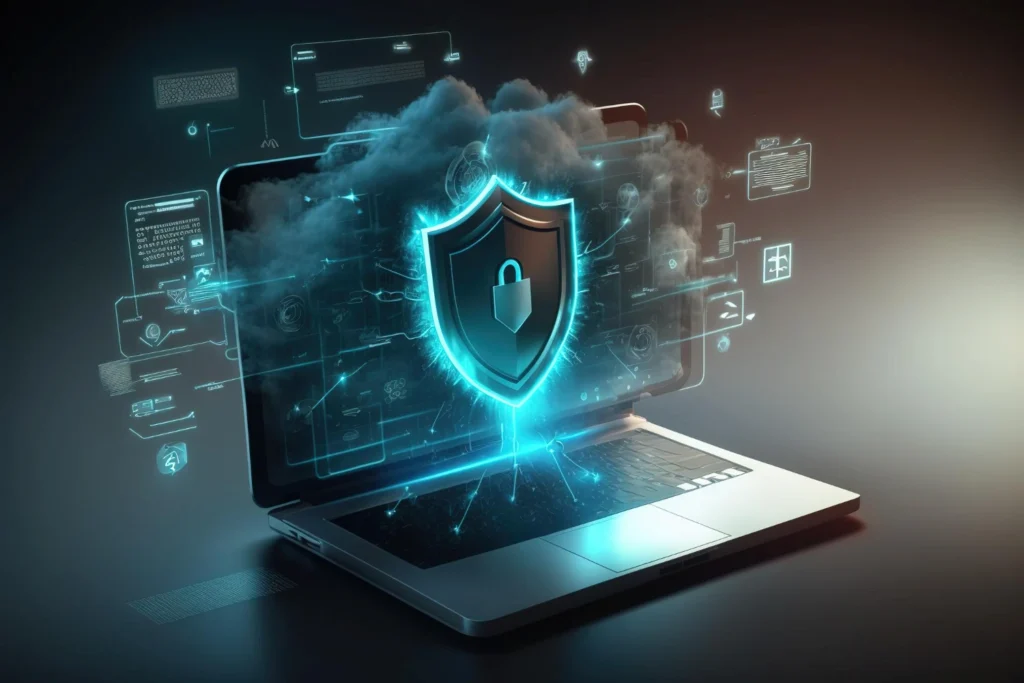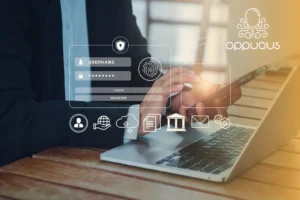Do you know what every digital touch, click, and scroll leads us to?
Online vulnerability.
Almost all online activity leaves a certain trail or what is also called a digital footprint.
With global business intertwined with the internet, the days of data breaches are upon everyone. Ignoring the looming peril of cyber threats invites danger.
We’re not trying to be fear mongers, but it’s past time businesses were aware of modern-day hacking and how they can start managing cyber threats. In this blog post, we delve into the four essential types of cybersecurity services.
Or, skip the legwork and hire a firm like Oppuous to take advantage of the best cybersecurity services!
What Is Cybersecurity?
Cybersecurity, also recognized as information security, refers to a set of standards and practices adopted by organizations to safeguard their computer systems, networks, and data against unauthorized access, use, disruption, disclosure, modification, or destruction.
It includes a broad range of technologies, processes, and policies to counter cyber threats such as hacking, phishing, malware, clickjacking, ransomware, and various forms of cybercrime.
The primary objective of cybersecurity services is to shield sensitive information, like personal details, and confidential business information, like trade secrets and intellectual property.
Without further ado, let’s dive into the four most common types of cybersecurity services.
Types of Cybersecurity Services
Critical Infrastructure Security
Critical infrastructure security is dedicated to safeguarding from both malicious activity and natural disasters the digital and physical systems, networks, and assets upon which modern society depends, including systems related to energy, water, transportation, and communications.
Usually, infrastructure cybersecurity services entails comprehensive risk assessments, vulnerability assessments, incident response plans, employee security awareness training, and continual monitoring activities.
Examples of critical infrastructures include:
- Electricity grid
- Water purification systems
- Traffic lights
- Shopping centers
- Hospitals.
In addition to virtual defenses, critical infrastructure security incorporates physical safeguards, like building access controls, cameras and video surveillance systems, and firewalls. These measures collectively act as barriers to prevent illegal access to or interference with vital services.
Entities entrusted with securing these critical infrastructures must assess the vulnerabilities inherent in each system and design preventive strategies to avert potential damage.
Network Security
Network security protects internal networks against unauthorized intrusions driven by malicious intent. To enhance current security programming, security experts incorporate machine learning which detects abnormal traffic in real time and promptly alerts administrators to potential threats.
Ongoing efforts by network administrators include the implementation of procedures such as response services to thwart unauthorized access, modification, and exploitation of the network.
Key examples of network security implementations include:
- Security assessment
- New passwords
- Antivirus programs
- Anti-spyware software
- Encryption
- Firewalls.
These cybersecurity services are particularly essential for businesses relying on computer networks for operation and customer information storage. Various methods are employed, including firewalls, encryption, antivirus software, and user authentication processes such as password protection.
For robust network security implementation, consider using the following:
- Virtual private network (VPN)
- Endpoint detection and response (EDR)
- Penetration test
- Intrusion prevention system (IPS)
- Security information and event management (SIEM)
- Access control.
These tools collectively contribute to a comprehensive cybersecurity strategy, ensuring a strong defense against potential threats and reinforcing the overall security of the IT infrastructure.
Instead of getting these cybersecurity services and tools separately, introduce Oppuous to your company. With our suite of security and management services, you can leverage multiple data protection providers under one marketplace at the best prices!
Cloud Security
Cloud security has debunked prevailing misconceptions suggesting cloud computing’s inferior security compared to traditional methods. Physical ownership and control do not inherently guarantee data security. Cloud security proves that the importance of accessibility transcends the physical confines of data storage.
According to a past Alert Logic Cloud Security Report, the contrast between on-premises and service provider environments is clear. On-premises users faced an average of 612 incidents per user compared to 405 incidents per public cloud user over an 18-month period.
Cloud computing security mirrors traditional on-premise data centers but eliminates the burdens of maintaining expansive data facilities, resulting in substantially fewer security breach risks.
Leading IT service providers advocate the adoption of third-party security tools and techniques to fortify cloud environments against potential disasters.
A combination of encryption, multi-factor authentication, software updates, managed security services, intrusion detection and prevention systems, and network isolation technology forms a robust defense against illegal access and disruptions, rendering penetration by attackers more challenging.
Internet of Things (IoT) Security
This service includes protective, identifying, and monitoring measures addressing vulnerabilities in devices that may pose security risks to businesses.
Fortune Business Insights reports that the global IoT market size in 2022 was valued at $544.38 billion and projected to grow from $662.21 billion in 2024 to $3,352.97 billion by 2030, a CAGR increase of 26.1%. The core technologies driving the IoT market include data centers, analytics, consumer devices, networks, legacy embedded systems, and connectors.
While IoT devices enhance productivity, they also expose organizations to new cyber threats. Cyber criminals exploit vulnerable devices connected to the internet for unauthorized access to corporate networks or to incorporate them into global bot networks.
Oppuous Is Your Secret Weapon Against Cyber Criminals
From your home’s local computer to NASA’s Pleiades, every system needs constant monitoring to stay safe. With the four cyber security services described above, you can ensure that your business data is protected.
To employ the latest cybersecurity tools and train employees at one low price, get in touch with Oppuous today! Our advisory services help you find the best provider for your digital protection needs!









